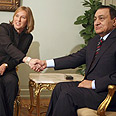
Mubarak and Livni this week
צילום: רויטרס
Egypt faces economic crisis
Egyptian economy tanks in 2008, grim outlook for 2009; government, already accused of doctoring dismal statistics, may have to raise taxes
The year 2008 has not been a good one for the Egyptian economy and 2009 will potentially be worse. It's likely that Egyptian President Hosni Mubarak was considering just this during his recent meeting with Foreign Minister Tzipi Livni in Cairo, held to discuss the situation in Gaza.
Even prior to the global economic crisis, the Egyptian economy was suffering massive inflation (over 20% in the first 11 months of the year.) Several strikes were reported in the first half of the year, occasionally requiring the intervention of security forces.
One group went so far as to try and initiate a general strike, which was ultimately unsuccessful yet clearly showed the disquiet in respect to the financial situation in the country.
Since the recession, matters have gotten worse for Israel's southern neighbor. The Egyptian stock market dropped by 40% in October, with few indices expected to rise anytime soon.
Regional and economic experts doubt whether the government is prepared to deal with such crisis. As it is, the leadership has recently garnered massive criticism for suspicions that it is doctoring economic statistics to make them appear less dismal than they truly are.
For example, Egypt is suspected of grossly inflating the employment rate and severely under-reporting rates of inflation, the latter by as much as 10%.
Ordinary Egyptians fear that, pursuant to the grim financial situation, the government will introduce new taxes or decrease subsidies. Such move is expected to be risky, particularly politically.
Dr. Gil Feiler is founder and managing director of Info-Prod Research (Middle East) Ltd., and Doron Peskin is head of research










